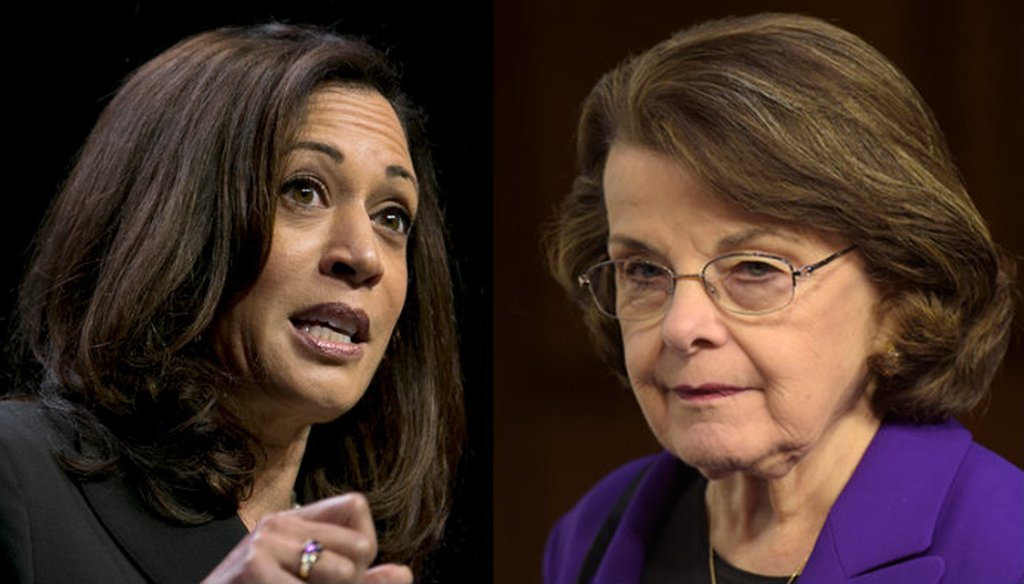Get PolitiFact in your inbox.

California Sens. Kamala Harris and Dianne Feinstein. Rich Pedroncelli / Associated Press
Politicians on both sides of the aisle have panned the Senate Republican health care plan for its deep cuts to Medicaid and for imposing higher costs on older residents. Critics have also said the bill would loosen protections for individuals suffering from pre-existing conditions.
A vote on the bill was delayed in late June 2017 as one poll showed only 12 percent of Americans support the proposal to replace Obamacare.
California Democratic Senators Kamala Harris and Dianne Feinstein have been among the most vocal critics of the bill, known formally as the Better Care Reconciliation Act.
Harris and Feinstein made several claims about the Senate plan and its potential impact on Californians in a call with reporters on June 26, 2017.
We wanted to know whether facts back up their statements, from Harris’ claim that the plan "effectively will end Medicaid" to Feinstein’s dramatic assertion that some children’s hospitals "will likely not be able to keep their doors open."
We decided to point out key context related to the claims and the sources of information they relied on, but we haven’t formally placed the claims on our Truth-O-Meter.
The end of Medicaid?
We started with a bold claim by Sen. Harris that the GOP plan "effectively will end Medicaid."
Harris said she based that claim on estimates from the Congressional Budget Office. It projects the Senate bill would cut $772 billion dollars in funding to Medicaid over 10 years. But the CBO score didn’t predict the wholesale demise of Medicaid. Rather, it estimated that the program would operate at a significantly lower budget than if President Obama’s Affordable Care Act (ACA) were to remain in place.
Yearly federal spending on Medicaid would decrease about 26 percent by 2026 as a result of cuts to the program, according to the CBO analysis. At the request of Senate Democrats, the CBO made another somewhat more tentative estimate that Medicaid spending could be cut 35 percent in two decades.
Harris’ statement could be construed as saying Medicaid, as it now exists, would essentially end. Still, the reductions proposed in the GOP bill wouldn’t end the program for good.
Asked to back up the senator’s comments, Harris’ spokesman pointed to a recent report by the Center on Budget and Policy and Priorities, "Senate Health Care Bill Ends Medicaid As We Know It, With Event Bigger Cuts Than House Bill".
That report predicts states will need to raise taxes and cut spending in places such as education to compensate for the curbs on Medicaid funding. It also predicts states will need to make direct cuts to Medicaid spending.
For the 13.5 million Californians currently enrolled in Medicaid, this could mean considerable rollbacks in coverage and health services offered — though not an entire erasure.

Covered California is the insurance exchange set up by the Affordable Care Act.
California enrollees?
Harris not only touched on Medicaid’s future, but also made a claim about how many Californians have signed up for insurance under Obamacare in the recent past.
"We know in California, since 2013, we signed up 1.7 million people," Harris said. She cited that number as having come from Covered California, the insurance exchange set up by the Affordable Care Act.
Specifically, that 1.7 million figure represents the total number of people in the state who obtained health coverage in 2016 through the exchange, for at least one month. That’s according to a March 2017 Covered California report cited by Harris’ spokesman.
Harris appears to have the total number correct for those who obtained coverage in 2016, but listed the wrong timeframe.
The report goes on to say Covered California "has served 2.9 million consumers since it opened its doors in 2014."
We wanted to know more about current enrollment in the exchange.
We found approximately 1.5 million people were insured through Covered California by the end of the most recent enrollment period, in January, according to data from the Centers for Medicare and Medicaid Services.
Like the House plan, the Senate proposal would eliminate the mandate that individuals purchase health insurance.
Enrollment in Covered California could drop by 260,000 without the individual mandate, according to an April analysis by the state insurance exchange.
Long-term losses
Feinstein was similarly concerned with the Republican health bill’s effect on the Golden State.
She warned it could result in the loss of health insurance for millions of Californians.
"Here’s the bottom line: 22 million Americans could lose their health coverage by 2026," she said. "That’s between three and four million in California, with 1.6 million losing insurance next year. California would see the nation’s biggest increase in the number of uninsured people next year."
The 22 million number comes directly from the CBO estimate. But that estimate does not include a state-by-state analysis of the Senate bill. Feinstein’s claim that 1.6 million Californians could lose insurance in 2018 was taken from scorecards made by Democratic staffers on the congressional Joint Economic Committee.
Democrats across the country, including California representative John Garamendi, tweeted these scorecards last week as part of an effort to fight the Republican bill.
It’s unclear from Feinstein’s statement how Golden State residents might lose their coverage. The CBO report noted that without the individual mandate, which penalized people for not purchasing insurance, many would not have an incentive to buy coverage.
Analysts also say many could be priced out of an insurance plan, while others could lose Medi-Cal eligibility.
For example: 60 year-olds making $20,000 in California could see their annual premiums increase three to eight times, depending on location, according to one initial analysis from the nonpartisan National Academy for State Health Policy.
Closing children’s hospitals?
In perhaps the most dramatic claim, Feinstein said under the GOP plan some children’s hospitals "will likely not be able to keep their doors open."
As evidence, Feinstein cited the plan’s Medicaid reductions, and the toll those cuts would take on California’s Medi-Cal program for low-income and disabled residents.
In California, "40 to 80 percent of children who visit our children’s hospitals are covered by Medi-Cal," Feinstein said in the call with reporters. We found that Medi-Cal funds more than 60 percent of visits to the eight hospitals that are part of the California Children’s Hospital Association, according to the association’s website. More than half the children who visit these hospitals are enrolled in Medi-Cal.
In general, more than 5.5 million people ages 0-20 in California are insured through Medi-Cal, according to the California Department of Health Care Services, which administers the program.
Children’s hospitals certainly depend on Medi-Cal dollars. Still, we wondered whether they would really close under the Republican health plan.
We couldn’t find any definitive evidence that children’s hospitals would close. But some health leaders did back up Feinstein’s assertion that it’s possible.
Todd Suntrapak, CEO of Valley Children’s Hospital in Fresno, said under the GOP plan "it’s very likely that some children’s hospitals won’t be able to keep their doors open at some point down the road." Suntrapak made that claim in a news release issued by Feinstein’s office on June 30, 2017. He and two other California children’s hospital leaders warned about the potential of cutting programs and services if the Senate plan passes.
Feinstein’s news release listed three hospitals the senator said are particularly threatened due to their high-population of Medi-Cal enrolled patients. Those are: The Valley Children’s Hospital in Fresno; Children’s Hospital Los Angeles; and UCSF Benioff Children’s Hospital Oakland.
Paul Viviano, CEO of Children’s Hospital Los Angeles, added in the news release that his hospital "would do everything it could to remain open but we wouldn’t be able to keep our doors open without making substantial cuts."
A spokesman for Senate Republican Majority Leader Mitch McConnell declined to directly address Feinstein’s claims on the record.
"We are continuing to work with Senators, the White House and the Congressional Budget Office," the spokesman said in an email, "but have not yet made any announcements on the version of the bill that the Senate will take up. Once we do, there will be a CBO report and bill text for everyone to review."
PolitiFact California intern Eli Flesch contributed research and writing to this article.
Our Sources
Sen. Kamala Harris and Dianne Feinstein, conference call, June 26, 2017
Interview, Don Stewart, spokesman for Senate Republican Majority Leader Mitch McConnell, July 6, 2017
Interview, Tyrone Gayle, spokesman for Sen. Kamala Harris, July 7, 2016
CNN.com, Paul Viviano, commentary, "Children will pay cruel price for GOP health bill," June 30, 2017
USA Today, Poll: Only 12% of Americans support the Senate health care plan, June 28, 2017
Sen. Dianne Feinstein, news release, Medicaid Cuts Would Crush California Hospitals, June 30, 2017
Congressional Budget Office, "Congressional Budget Office Cost Estimate: Better Care Reconciliation Act of 2017," June 26, 2017
Politico, "CBO: Medicaid spending falls 35 percent in 20 years under Senate health bill," June 29, 2017
National Academy for State Health Policy, "Barely Covered: Initial Analysis of Coverage and Affordability Impacts to Consumers under the Proposed Better Care Reconciliation Act," June 2017
California Department of Health Care Services, "Medi-Cal Monthly Enrollment Fast Facts," January 2017
Covered California, "Bringing Health Care Coverage Within Reach," March 14, 2017
Covered California, "Analysis of Impact to California’s Individual Market If Federal Policy Changes Are Implemented," April 27, 2017
Associated Press, "Covered California enrolls 368,000 new customers — down from last year," February 6, 2017.
Center on Budget and Policy and Priorities, "Senate Health Care Bill Ends Medicaid As We Know It, With Event Bigger Cuts Than House Bill", July 6, 2017
















































